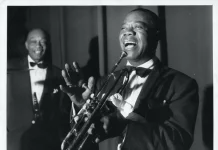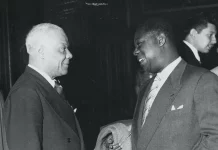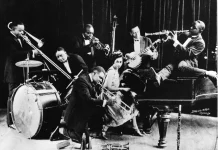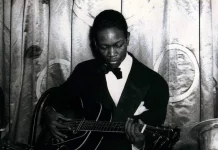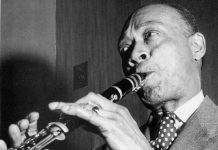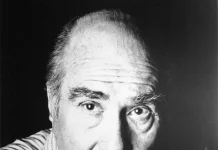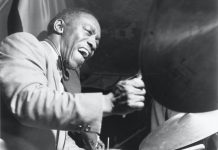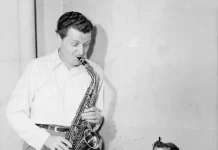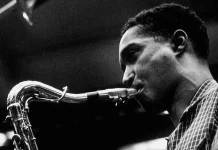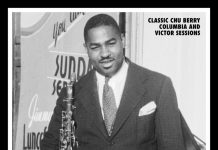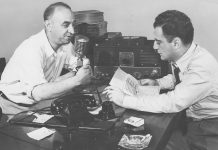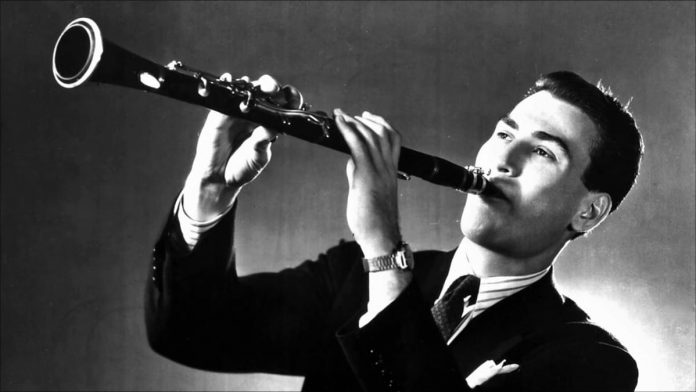
“I’d like to tell a funny story about Artie Shaw,” said Al Cohn.
“But there aren’t any.”
Maybe not, but there was much wisdom to be found in many of Artie’s remarks.
“It might be a good career move for me to drop dead,” said Artie. “Look what it did for Glenn Miller.
“The public expect you to behave like a trained seal, to do the same damn thing over and over again.
“The bigger the audience, the dumber the response. I’m not particularly interested in human creatures as a mass. As a mass they’re totally stupid – stone age.”
Shaw was a very great jazz musician and a uniquely gifted self-taught clarinettist. The body of high quality music that he left behind is enormous for just one man. Concomitant with that he was amongst the most difficult men that you could ever meet. He had an outstandingly wide-ranging intellect and wanted to change the world. As a young man he subscribed, as so many thinkers then did, to communism and when he was 21 in 1931 had a letter published in the Daily Worker condemning jazz as decadent, which was then the party line. Although never a party member, in 1953 he was arraigned before the House Committee on Un-American Activities. As anybody would be he was chastened and intimidated by its McCarthy-ite assault. “All the people I knew were either killed by it or as good as. Anything that was of any value was taken from them.” Short stories that he had with publishers were instantly returned to him and to escape the opprobrium Shaw sailed for Europe on the Queen Mary, disembarked at Naples and drove up the coast and into France and then, finally, to Spain and the mountainside medieval village of Bagur, where he settled for a time.
It’s hard to think of Shaw as having been conceited – he knew what his talents were and he was frank about them. He didn’t care at all about being popular. On one occasion he walked up to Benny Goodman and said: “Practise, and you’ll get to be as good as I am.”
The matter of his eight wives and his affairs with Rita Hayworth and Betty Grable doesn’t concern us here.
“None of them were real marriages,” said Shaw. “They were legalised affairs. In those days you couldn’t get a lease on an apartment if you were living in sin.” He also had affairs with Rita Hayworth and Betty Grable. But there’ll be no sex here – we’re English, goddamit.
The full body of Artie’s original music is daunting. He and Benny Goodman were the bandleader-clarinettists who bestrode the years of swing and, with Buddy DeFranco, were the most accomplished jazz clarinet players in history. Crucially DeFranco described Shaw to me as “a much more progressive player than Benny Goodman”. He said: “He was a more interesting player and would create things harmonically that Goodman never dreamed of.”
‘Jitterbugs are morons who would listen to a wind shield wiper as long as they could dance’
Shaw also had a fatter tone on the clarinet than Goodman’s and was incredibly nimble throughout the full range of the instrument. Both men were also capable symphonic players. However, Goodman and Tommy Dorsey out-ranked Artie in terms of financial success.
Over the years Artie had more than a dozen bands. Each had unique qualities, and he had a penchant to add a string section whenever he felt like it.
Tommy Dorsey refused to appear on the same record as Shaw, who said: “One day RCA rang me up and said: ‘We want to do a record with Stardust on both sides, one by you and one by Tommy.’ Our version – the one with Billy Butterfield and Jack Jenny – worked on the first take, so I sent the band home.
“When Tommy came to make his version, he asked to hear what I’d already done. When he heard it he said: ‘I ain’t getting on the back of that.’ So my version came out without Tommy’s version and that meant he lost the royalties on about 16 million records.”
In autumn 1939, during a booking at the Café Rouge, he decided he’d had enough and left the business, saying “Jitterbugs are morons who would listen to a wind shield wiper as long as they could dance.”
He was fed up.”We used to do seven shows a day, seven days a week, months at a time. Can you imagine how boring it is to start every show with S’Wonderful and end with Concerto For Clarinet? And if we changed anything the manager would go mad. How could you live with that?”
The great mass of Artie’s recording output for RCA (the main label of his career) is contained in a bulging, inexpensive 10-CD set (247 titles) on the German Membran label. However, the specialised jazz fan will perhaps be more stimulated by the much rarer items on the Hep label. Its owner Alastair Robertson is a Shaw enthusiast, who writes very perceptively in many of the liner notes. There are probably a dozen of the Hep Shaw issues listed on Amazon – I have seven of them and I would rate each of them as outstanding amongst his output. Five have typically trenchant essays by Alastair.
Artie reached the highpoint of his achievements with his several returns to the studio between 1949 and 1954. A lot of the tapes that he made he commissioned himself and then presumably sold them to the MusicMasters label where they appeared much later on various labels in England. Some were by a 1949-50 big band, but the bulk were by a Gramercy Five that approached perfection. Apart from Artie the quintet had as its root pianist Hank Jones, always effective throughout his magnificent career, but seldom better than here. Tal Farlow was perfection on the February/March 1954 New York sessions, but Joe Puma, who replaced him in the Hollywood sessions that June, ran Tal close.
But of course it was all about Artie, a towering presence who probably outplayed anything he had done before.
“After that I went to Australia and played some concerts with Ella Fitzgerald, Buddy Rich and Jerry Colonna. After four or five days around Australia I never played again and I’ve never regretted it.”
Personal opinion must decide whether he played better jazz than Benny. He was probably more self-assured and was easier moving through the registers. Over his life the influences that produced this final mature clarinettist had included everyone from Armstrong on down. Artie’s lyricism was outstanding and his tone unique.
He knew his worth and wasn’t afraid to put it into words: “The so-called giants of the swing era were Dorsey, Goodman, Miller, Lunceford, Basie and me. They’re all dead except me. So I must have done something right.” Artie presumably thought Duke to be immortal.
There’s an Artie Shaw website (artieshaw.com), which houses a biographical statement, the actual source of which invites an inevitable suspicion. Written in the third person, it says “Shaw is regarded by many as the finest and most innovative of all jazz clarinettists, a leader of some of the greatest musical aggregations ever assembled and one of the most adventurous and accomplished figures in American music.”
Terry Teachout, commenting in the New York Times, wrote: “You’d have to laugh at such braggadocio, except for one thing – it’s all true.”
It is indeed.

